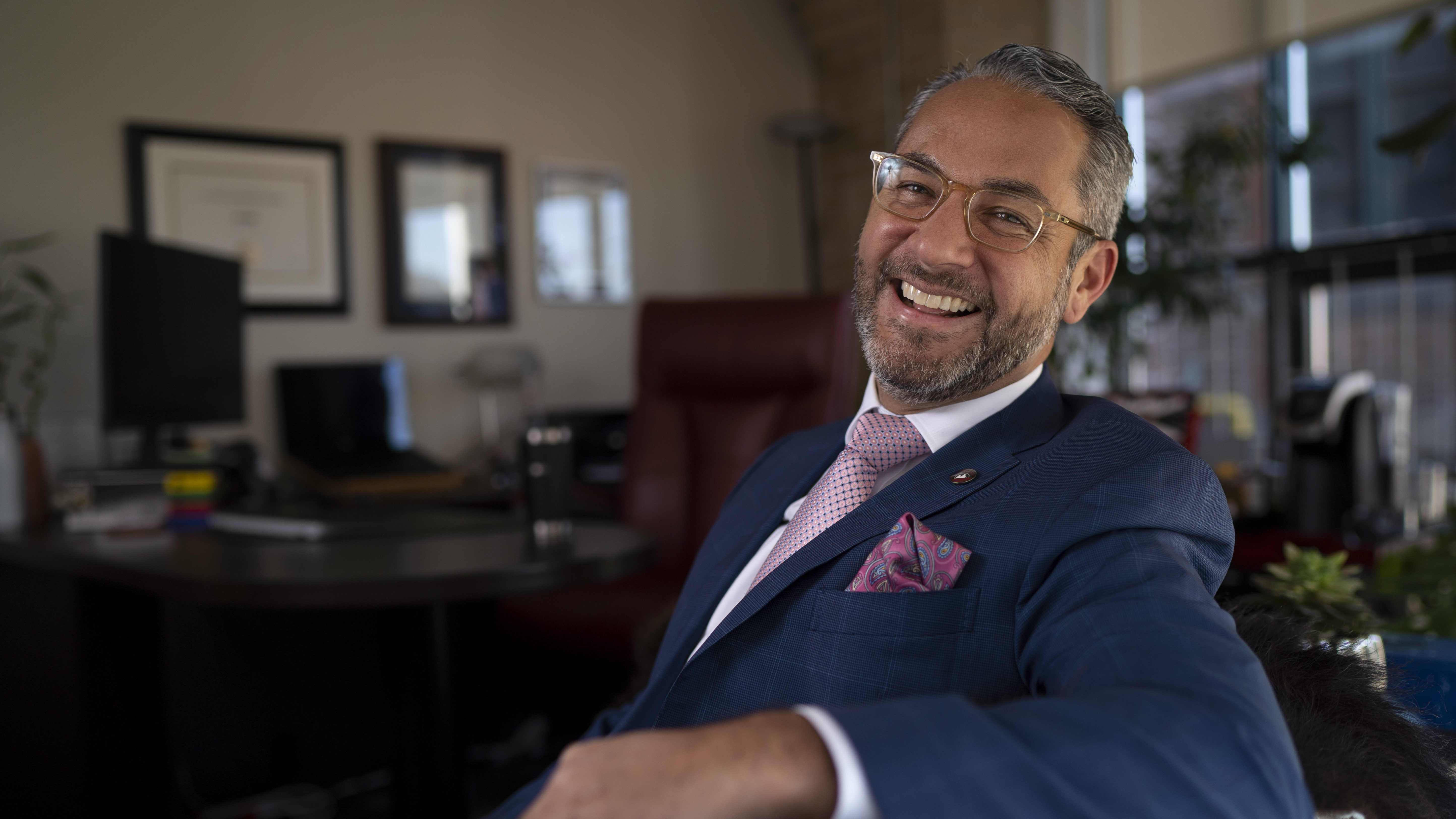
JP (Jean Paul) Gladu is photographed in Toronto, Ontario on Friday, January 17, 2020. Gladu is leaving his role as head of the Canadian Council for Aboriginal Business to take on the job as CEO of Bouchier, one of the largest contracting firms in the Athabasca oil sands region, based in Fort McMurray. Photograph for Canadian Energy Centre
For Jean Paul (JP) Gladu, now is the right time to head west despite challenges facing the oil and gas industry.
“People are leaving and I’m going in,” he says.
After heading up the Canadian Council for Aboriginal Business (CCAB) for seven years, Gladu is moving to Fort McMurray, Alta., in April to take on the role of CEO of Bouchier, one of the largest Indigenous-owned contracting firms in the country.
He’s looking forward to life in Alberta. “I’ve always considered myself an Albertan at heart. I’ve spent a lot of time out there. I have a lot of friends and I have a lot of respect for the communities out there, especially Fort McMurray [which] has gone through so much. The resiliency of the people of that town is extraordinary.”
Founded in 1998 with a single used bulldozer, Bouchier has become a major player in the oil sands industry, providing contracting, construction, facilities management, engineering, and procurement services.
Gladu will take over as CEO from Nicole Bourque-Bouchier, a member of the Mikisew Cree First Nation, who co-owns Bouchier Group with her husband, company founder Dave Bouchier, a member of the Fort McKay First Nation.
“They have an extraordinary story of perseverance and respect for community,” Gladu says.
“I’m going in because I believe in what Dave and Nicole have done. I’m going in because they still see growth. They see growth not only in oil and gas, but they see growth in other areas.”
Gladu, who is Anishinaabe and a member of Bingwi Neyaashi Anishinaabek First Nation on the shores of Lake Nipigon, ON, says the Bouchiers share both his values and those of CCAB.
Among Bouchier’s 1,000 staff, 40 per cent are Indigenous. The company also sources goods and services from local Indigenous suppliers and has been recognized for giving back to the community.
It’s a good fit for Gladu, who wants to see what he calls economic reconciliation: more opportunities and good wages so Indigenous communities are managing wealth, not poverty.
The key, he says, is procurement opportunities, citing Cenovus Energy as an example. The company recently announced plans to spend at least $1.5 billion with Indigenous-owned or operated businesses in the next 10 years, adding to the almost $3 billion it has spent with these companies since 2009.
The Canadian Association of Petroleum Producers (CAPP) estimates that in 2015-2016 alone, oil sands companies spent $3.3 billion on procurement from Indigenous-owned businesses.
Before joining CCAB, Gladu was in natural resources for more than two decades. He studied forestry, then business both at Queen’s University and the University of Toronto. He serves on the Ontario Power Generation Board of Directors. And a few years ago, he was appointed Chancellor of St. Paul’s University College at the University of Waterloo, where he was recognized for his positive impact within First Nations across Canada.
Gladu says the new job will be a big change but he does not shy away from a challenge. Nor does he shy away from the energy debate. He says the majority of First Nations support development.
“Our people have relied on oil, gas, mining, and forestry…businesses have proliferated because of it.
“My grandfather was a logger, my dad was a logger, my other grandfather worked for the TransCanada pipeline [now TC Energy].
“I am very pro-resource development. It’s my lineage, and I see the opportunities. I see the value in it. I see the challenges.
“I don’t shy away from this conversation. I respect the views of others as well that are opposed to oil and gas. I don’t agree with everything they say but I certainly appreciate their voice.”
He says those other voices “keep you honest and it keeps you working for a better future.
“This is about transition,” he adds. “The world still needs oil and gas. Why wouldn’t we procure oil and gas from our own country? Why wouldn’t we procure it from the country that probably has one of the best human rights standards in the world? We’ve got so many regulations, so many watchdogs. Why wouldn’t we be empowering our own communities while we go through this transition?”
He believes there is some important common ground within the larger debate: “To secure a future for our kids and that means economic and environment.”
He wants to get back to the land on weekends, and maybe take his 16-year-old daughter moose hunting.
“Hunting was such a passion of my dad’s that I was always around it at a very young age and it’s a passion of mine now,” he says.
About the Canadian Energy Centre (CEC)
The Canadian Energy Centre (CEC) is an independent provincial corporation that is primarily supported by the Government of Alberta’s industry-funded Technology, Innovation and Emissions Reduction (TIER) fund. The CEC’s mandate is to promote Canada as the supplier of choice for the world’s growing demand for responsibly produced energy. At its core, the CEC will also create a new, pragmatic, fact-based narrative about Canadian energy.
Visit the Canadian Energy Centre website
Share This:





 CDN NEWS |
CDN NEWS |  US NEWS
US NEWS 





























